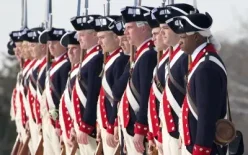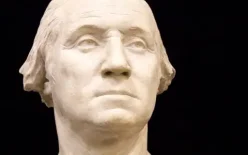MOUNT VERNON, VA – In celebration of George Washington’s 285th birthday, seven books published in 2016 by the country’s most prominent historians have been named finalists for the George Washington Prize. The annual award recognizes the past year’s best-written works on the nation’s founding era, especially those that have the potential to advance broad public understanding of early American history.
Created in 2005 by the Gilder Lehrman Institute of American History, George Washington’s Mount Vernon, and Washington College, the $50,000 George Washington Prize is one of the nation’s largest and most notable literary awards, and this year’s finalists include past Pulitzer Prize and National Book Award winners.
The finalists’ books combine depth of scholarship and broad expanse of inquiry with vivid prose that exposes the complexities of our founding narrative. Through compelling storytelling, the authors introduce readers to citizen soldiers and statesmen, artists and frontiersmen, heroes and traitors, loyalists and rebels—the ordinary, the ambitious, and the exceptional men and women who, in the chaos and contradictions of revolution, imagined a different world order and gave shape to a new nation.
Written to engage a wide public audience, the books provide a “go-to” reading list for anyone interested in learning more about George Washington, his contemporaries, and the drama of the revolutionary founding of the United States of America.
The 2017 George Washington Prize finalists are:
- T. H. Breen, George Washington’s Journey: The President Forges a New Nation (Simon and Schuster)
- Annette Gordon-Reed and Peter S. Onuf, “Most Blessed of the Patriarchs”: Thomas Jefferson and the Empire of the Imagination (Liveright Publishing)
- Jane Kamensky, A Revolution in Color: The World of John Singleton Copley (W.W. Norton)
- Michael J. Klarman, The Framers’ Coup: The Making of the United States Constitution (Oxford University Press)
- Mark Edward Lender and Garry Wheeler Stone, Fatal Sunday: George Washington, the Monmouth Campaign, and the Politics of Battle (University of Oklahoma Press)
- Nathaniel Philbrick, Valiant Ambition: George Washington, Benedict Arnold, and the Fate of the American Revolution (Viking)
- Alan Taylor, American Revolutions: A Continental History, 1750-1804 (W.W. Norton)
A distinguished jury comprised of notable historians David Preston, Kathleen DuVal, and Nick Bunker, selected the finalists from a field of nearly 60 books. The winner of the 2017 prize will be announced, and all finalists recognized, at a black-tie gala on Thursday, May 25 at George Washington’s Mount Vernon.
More information about the George Washington Prize is available at washcoll.edu/gwbookprize.
AUTHOR BIOGRAPHIES
T.H. BREEN is currently the James Marsh Professor-at-large at the University of Vermont. He is the author of 11 books on U.S. history, many of them prizewinners. Recent works include The Marketplace of Revolution and American Insurgents, American Patriots.
ANNETTE GORDON-REED is the Pulitzer Prize-winning author of The Hemingses of Monticello, which also won the 2009 George Washington Prize and the National Book Award. She is the Charles Warren Professor of American Legal History at Harvard Law School.
PETER S. ONUF is the Thomas Jefferson Memorial Foundation Professor Emeritus at the University of Virginia and the senior research historian at the Robert H. Smith International Center for Jefferson Studies. Onuf also is a cohost for the radio show BackStory with the American History Guys.
JANE KAMENSKY is Professor of History and Pforzheimer Foundation Director of the Schlesinger Library at Harvard University. She is a historian of early America, the Atlantic world, and the age of revolutions. Her many books include The Exchange Artist, which was a finalist for the 2009 George Washington Prize.
MICHAEL J. KLARMAN is the Kirkland & Ellis Professor of Law at Harvard Law School and author of the Bancroft Prize-winning From Jim Crow to Civil Rights. He has won numerous awards for his teaching and scholarship, primarily in the areas of Constitutional law and Constitutional history.
MARK EDWARD LENDER is Professor Emeritus of History at Kean University in Union, New Jersey, and the coauthor of A Respectable Army and Citizen Soldier.
RY WHEELER STONE is retired as Regional Historian for the State Park Service and Historian for the Monmouth Battlefield State Park with the New Jersey Department of Environmental Protection.
NATHANIEL PHILBRICK is the New York Times bestselling author of In the Heart of the Sea, winner of the National Book Award; Mayflower, finalist for the Pulitzer Prize; Bunker Hill, winner of the New England Book Award; Sea of Glory; The Last Stand; Why Read Moby Dick?; and Away Off Shore.
ALAN TAYLOR is the Thomas Jefferson Professor of History at the University of Virginia. He is the author of many acclaimed books in early American history and has twice been awarded the Pulitzer Prize in History. His most recent book, The Internal Enemy, won the Pulitzer Prize and was a finalist for the National Book Award and the 2014 George Washington Prize.
###
ABOUT THE SPONSORS OF THE GEORGE WASHINGTON PRIZE
The Gilder Lehrman Institute of American History
Founded in 1994 by philanthropists Richard Gilder and Lewis E. Lehrman, the Gilder Lehrman Institute of American History is the nation’s leading nonprofit American history education organization. The Institute’s mission is to promote the knowledge and understanding of American history through educational programs and resources for teachers, students, and the general public. As a 501(c)(3) nonprofit public charity, the Gilder Lehrman Institute of American History is supported through the generosity of individuals, corporations, and foundations. The Institute’s programs have been recognized by awards from the White House, the National Endowment for the Humanities, and the Organization of American Historians.
For more information: www.gilderlehrman.org.
George Washington’s Mount Vernon
Since 1860, more than 85 million visitors have made George Washington’s Mount Vernon the most popular historic home in America. A privately-owned national treasure, Mount Vernon is maintained and operated by the Mount Vernon Ladies’ Association. Since purchasing the estate from the Washington family and assuming stewardship in 1858, the Association has embraced a heroic mission to preserve, protect, and maintain the estate for the American people, relying exclusively on private donations, admission fees, and restaurant and retail proceeds. Through robust education and outreach programs, the Association expands awareness about the exceptional life and character of George Washington, sustaining his legacy through research, interpretation, and public education. In experiences on the estate and through its digital outreach platforms, Mount Vernon strives to preserve George Washington’s place in history as “First in War, First in Peace, and First in the Hearts of His Countrymen.” For more information: www.mountvernon.org.
Washington College was founded in 1782, the first institution of higher learning established in the new republic. George Washington was not only a principal donor to the college, but also a member of its original governing board. He received an honorary degree from the college in June 1789, two months after assuming the presidency. The college’s C.V. Starr Center for the Study of the American Experience, which administers the George Washington Prize, is an innovative center for the study of history, culture, and politics, and fosters excellence in the art of written history through fellowships, prizes, and student programs. For more information: www.washcoll.edu.


